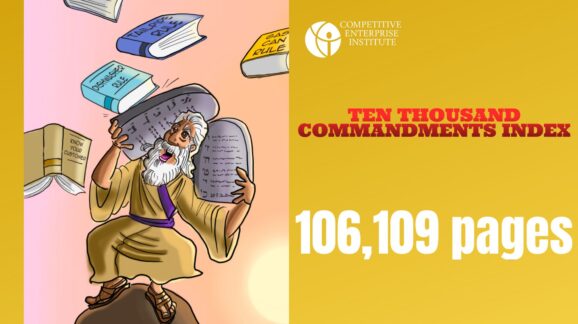There are two main areas in which Congress can enact meaningful reform. The first is to rein in regulatory guidance documents, which we refer to as “regulatory dark matter,” whereby agencies regulate through Federal Register notices, guidance documents, and other means outside standard rulemaking procedure. The second is to enact a series of reforms to increase agency transparency and accountability of all regulation and guidance. These include annual regulatory report cards for rulemaking agencies and regulatory cost estimates from the Office of Management and Budget for more than just a small subset of rules.
In 2019, President Trump signed two executive orders aimed at stopping the practice of agencies using guidance documents to effectively implement policy without going through the legally required notice and comment process.
Featured Posts

Blog
The Dreck Equation: Charting the regulatory cosmos
Most people think of federal regulation as the 3,000 or so rules published each year in the Federal Register and archived in the Code of…

Blog
The week in regulations: Deep seabed mining and recreational gulf gag
A massive flood in Texas killed at least 120 people. President Trump announced new 50 percent copper tariffs which will take effect on August 1.

Blog
The logbook of federal red tape last year came to…
The Federal Register for 2024 closed out Joe Biden’s final year in office with a record 106,109 pages. This count swamps the previous record of…
Search Posts
Blog
Guidance Documents of the Week: Consumer Product Safety Commission Revisited
Guidance documents are statements of policy issued by your favorite alphabet soup of agencies, which more often than not translate into law, despite rarely going…
Blog
This Week in Ridiculous Regulations
Washington, D.C.’s flash flood was followed up by a heat wave; this week could bring even worse during Congress’ final week in session before the…
Blog
What Should the Government Do?
What Should the Government Do? In that question lies most disagreements about politics. What can governments do, and just because they can, should they? …
Newsmax
Volcker Rule Burdens Banks, Markets
Newsmax cites a recent coalition letter signed by CEI opposing the Volcker Rule. That legislative ban would seem to apply here, because as…
Politico, Morning Energy
Perry Calls Efficiency Moves ‘Common Sense’
POLITICO‘s Morning Energy cites CEI’s recent petition for increased efficiency in dishwashers. PERRY: EASING EFFICIENCY IS ‘COMMON SENSE’: DOE will publish in the Federal…
FreedomWorks
The Passenger Facility Charge Is a Market-Minded Way to Address Airport Infrastructure
FreedomWorks cites a coalition letter CEI joined advocating for eliminating the cap on PFC. This is why a group of organizations associated with…
Staff & Scholars

Clyde Wayne Crews
Fred L. Smith Fellow in Regulatory Studies
- Business and Government
- Consumer Freedom
- Deregulation

Ryan Young
Senior Economist
- Antitrust
- Business and Government
- Regulatory Reform

Fred L. Smith, Jr.
Founder; Chairman Emeritus
- Automobiles and Roads
- Aviation
- Business and Government

Sam Kazman
Counsel Emeritus
- Antitrust
- Automobiles and Roads
- Banking and Finance

Marlo Lewis, Jr.
Senior Fellow
- Climate
- Energy
- Energy and Environment